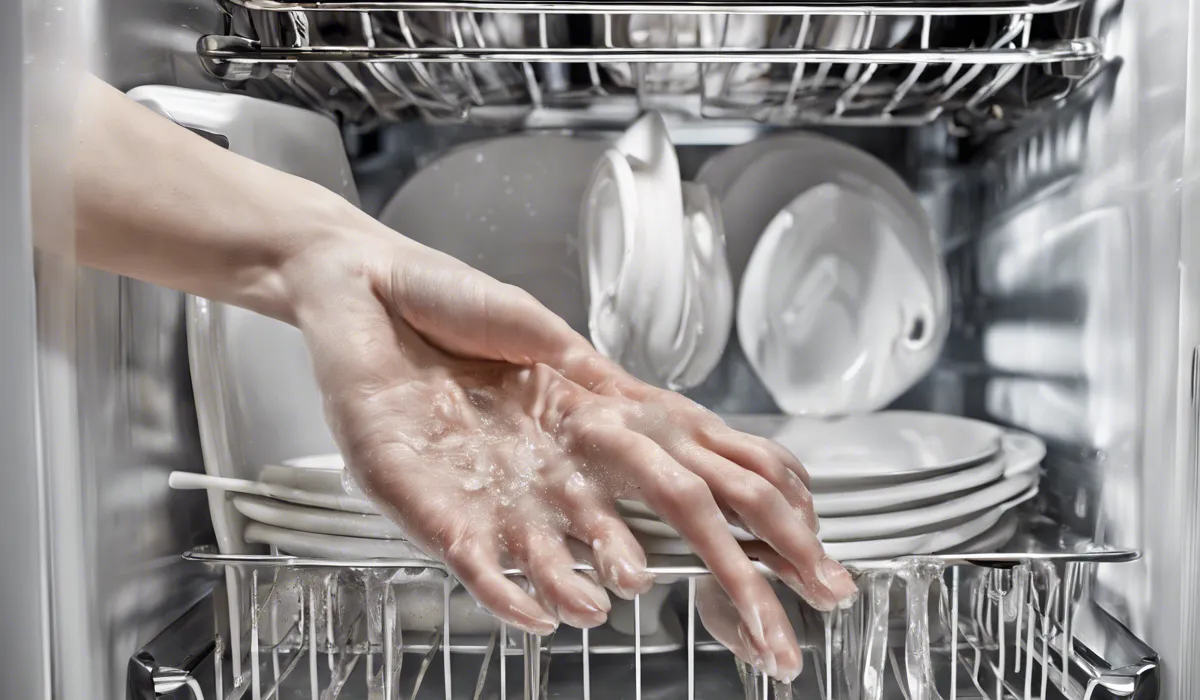Does Being a Dishwasher Ruin Your Hands? Unveiling the Truth
Being a dishwasher can lead to hand damage due to prolonged exposure to water and chemicals. Frequent hand washing and contact with hot water can strip skin of natural oils, causing dryness, cracking, and dermatitis. Wearing gloves can mitigate these effects.
Physical Impact of Dishwashing on Hands

Description of Common Dishwashing Tasks and Frequency
Dishwashing is a chore that many people do daily. This task involves scrubbing dishes, pots, and pans to remove food particles, grease, and stains.
It often includes rinsing items under running water and sometimes involves soaking them in water for extended periods.
For those who wash dishes by hand, this can mean multiple times a day, especially in households or professions where cooking and eating occur frequently.
Short-term Effects such as Skin Irritation and Dryness
Washing dishes can lead to immediate discomfort in the hands. Symptoms like skin irritation and dryness are common.
Hands may feel tight, rough, or itchy after prolonged exposure to water and cleaning agents. These symptoms arise because the skin’s protective oils are stripped away, leaving the hands vulnerable to environmental factors.
Long-term Effects Including the Risk of Developing Dermatitis
Over time, the damage to the skin barrier can become more severe. Regular dishwashers may face an increased risk of developing contact dermatitis, a condition characterized by red, inflamed, and itchy skin.
This risk is compounded for individuals with sensitive skin or those who have pre-existing skin conditions like eczema.
Discussion of the Role of Hot Water and Detergents in Causing Skin Issues
Hot water and harsh detergents play a significant role in causing skin issues. Hot water can exacerbate skin irritation and increase permeability, leading to more significant loss of natural oils.
Detergents, especially those with harsh chemicals, can further irritate and dry out the skin, making it more susceptible to damage.
Protective Measures and Best Practices

Importance of Using Gloves and Barriers to Protect Skin
Wearing gloves is one of the most effective ways to protect your hands from the adverse effects of dishwashing.
Gloves create a barrier that helps keep the skin’s natural oils intact and prevents direct contact with hot water and detergents. They can also reduce the risk of developing skin irritations and long-term conditions like dermatitis.
Recommendations for Mild, Skin-friendly Detergents
Choosing mild, skin-friendly detergents can make a significant difference in maintaining hand health.
These detergents contain fewer harsh chemicals and additives, reducing the likelihood of skin irritation. When possible, opt for products that are fragrance-free and formulated for sensitive skin.
Techniques for Minimizing Hand Immersion in Water
Limiting how often and how long hands are immersed in water can help preserve the skin’s integrity. Techniques like using a dish brush with a long handle or taking breaks during prolonged dishwashing sessions can minimize hand exposure to water and chemicals.
Tips for Hand Care Before and After Dishwashing
Taking care of your hands before and after washing dishes is vital. Applying a pre-wash moisturizer can help protect the skin, and using a nourishing hand cream afterward can restore moisture and repair the skin barrier.
Regularly moisturizing helps keep the skin supple and less prone to irritation.
Alternatives to Manual Dishwashing

Advancements in Dishwashing Appliances and Their Impact on Hand Health
The use of dishwashing appliances, such as automated dishwashers, can significantly reduce the need for manual dishwashing.
These appliances not only save time and effort but also help in maintaining hand health by limiting exposure to water and harsh chemicals.
They are an excellent investment for those concerned about the physical impact of dishwashing on their hands.
Outsourcing Dishwashing to Professional Services
For restaurants or individuals who can afford it, outsourcing dishwashing to professional services is another alternative.
These services can take the burden off your hands, literally, and are equipped to handle large volumes of dishes with industrial-grade equipment, further reducing the need for manual labor.
Shifts in Societal or Household Roles to Distribute Dishwashing Tasks
Sharing the responsibility of dishwashing within a household can prevent overburdening a single individual’s hands.
By rotating the task among family members or roommates, everyone contributes to the chore, and it lessens the frequency of exposure for any one person, helping to protect their hands from damage.
Exploring Dishwashing Tools That Reduce the Need for Hand Exposure
There are numerous dishwashing tools designed to reduce hand exposure to water and detergents.
Silicone scrubbers, dishwashing wands with soap dispensers, and even ultrasonic dish cleaners are available options that can help keep hands dry and chemical-free while tackling dirty dishes.
FAQs About Dishwasher Hand Damage
Can working as a dishwasher ruin your hands?
Yes, being a dishwasher can lead to hand damage due to continuous exposure to water and harsh chemicals, potentially causing dryness, cracking, and dermatitis.
What are the common hand problems faced by dishwashers?
Common problems include skin dryness, cracking, irritation, and contact dermatitis resulting from frequent hand washing and exposure to hot water and chemicals.
How can dishwashers protect their hands from damage?
Dishwashers can mitigate hand damage by wearing protective gloves and using moisturizers to replenish natural skin oils.
Is it necessary for dishwashers to wear gloves?
Yes, wearing gloves is essential for dishwashers to protect their hands from hot water, chemicals, and to prevent skin damage.
What type of gloves should dishwashers use to protect their hands?
Dishwashers should use waterproof, chemical-resistant gloves that are durable and provide a comfortable fit to best protect their hands during work.
Final Thoughts
Dishwashing can be detrimental to hand health, leading to skin damage from prolonged exposure to water and harsh chemicals.
Regular hand washing and handling hot water exacerbate dryness, cracking, and the risk of dermatitis. Protective gloves serve as a crucial barrier to prevent these harmful effects and preserve skin integrity.





